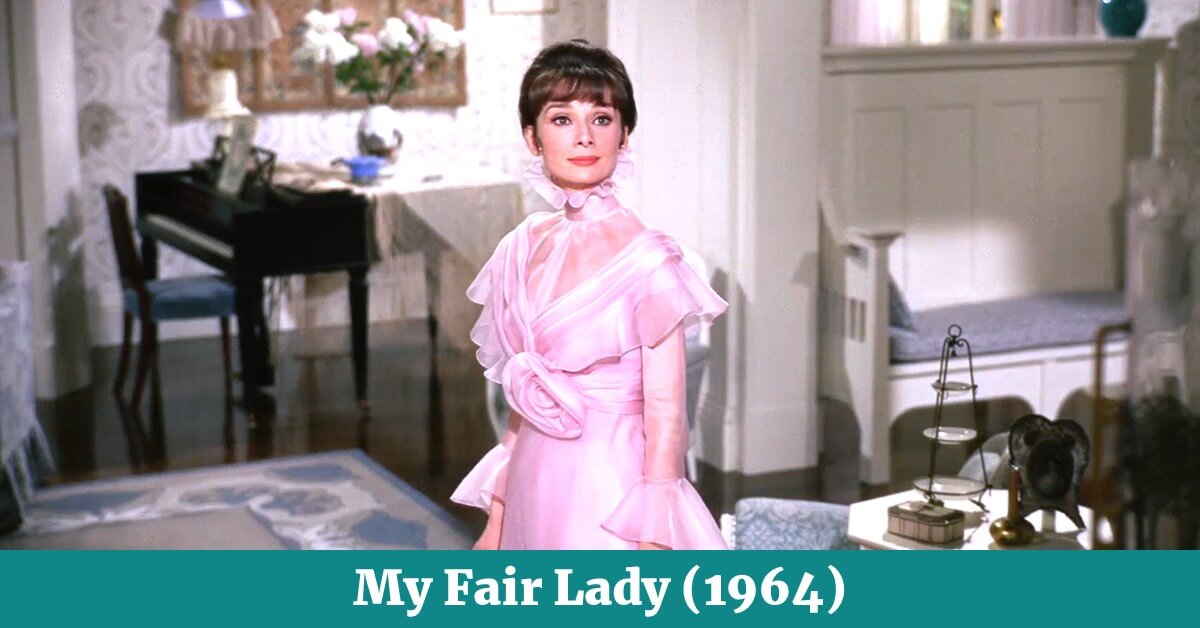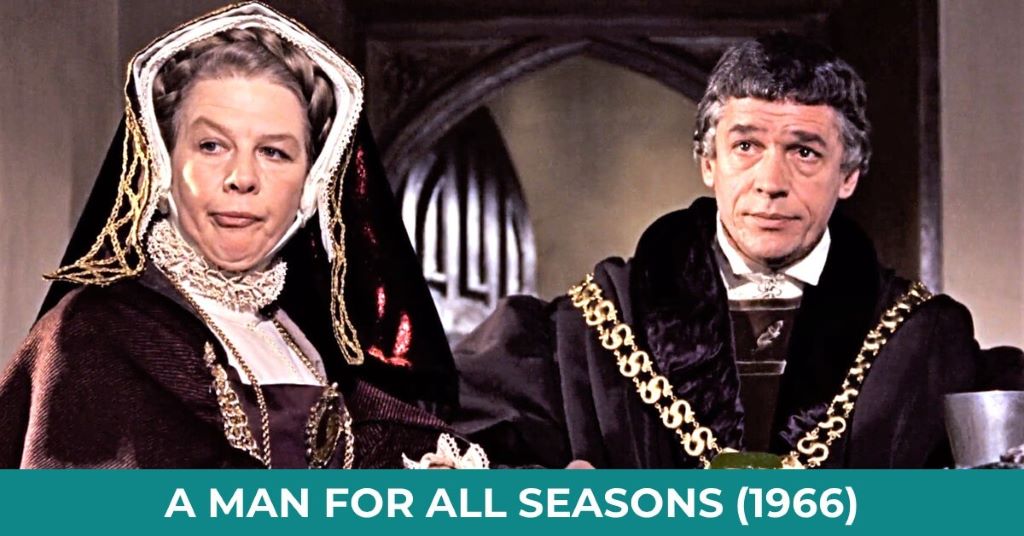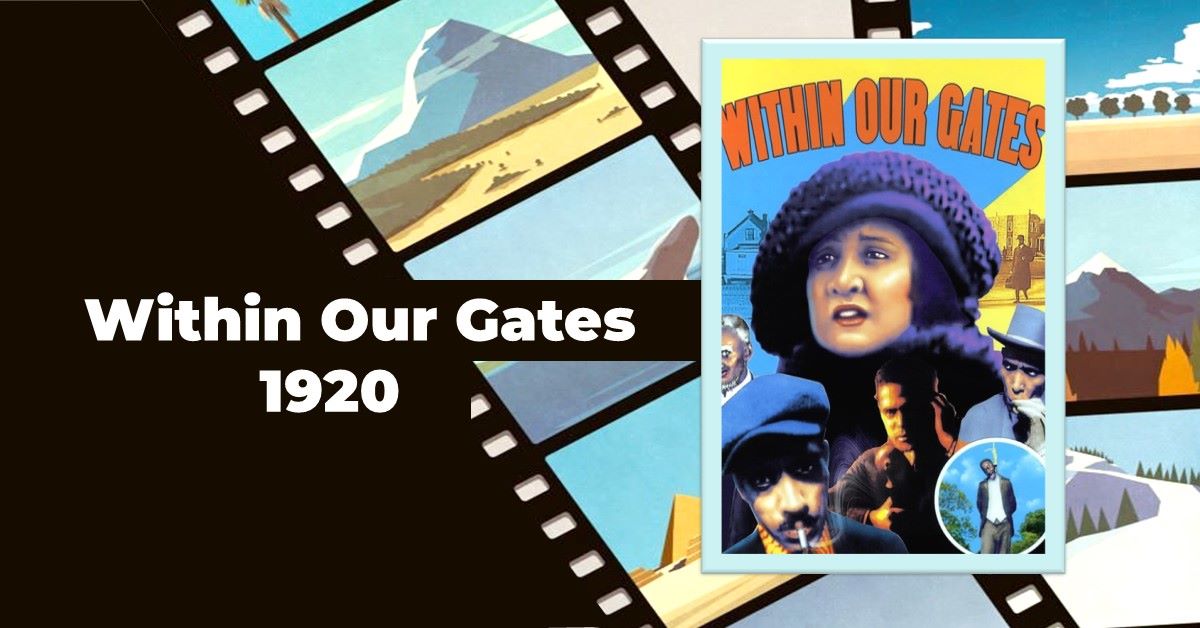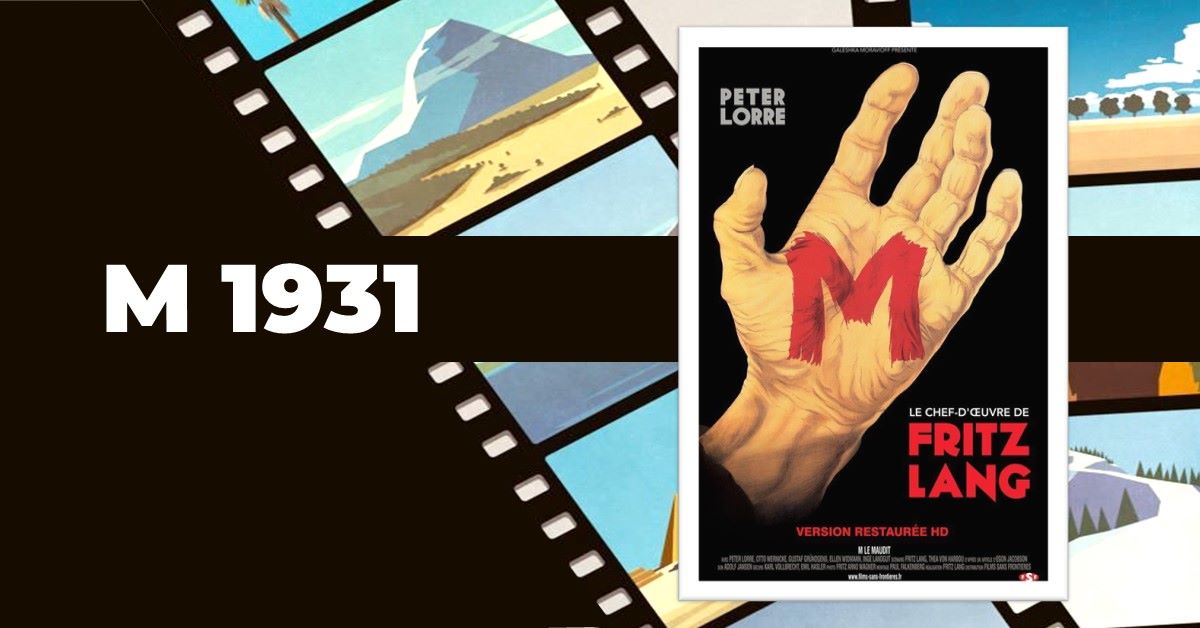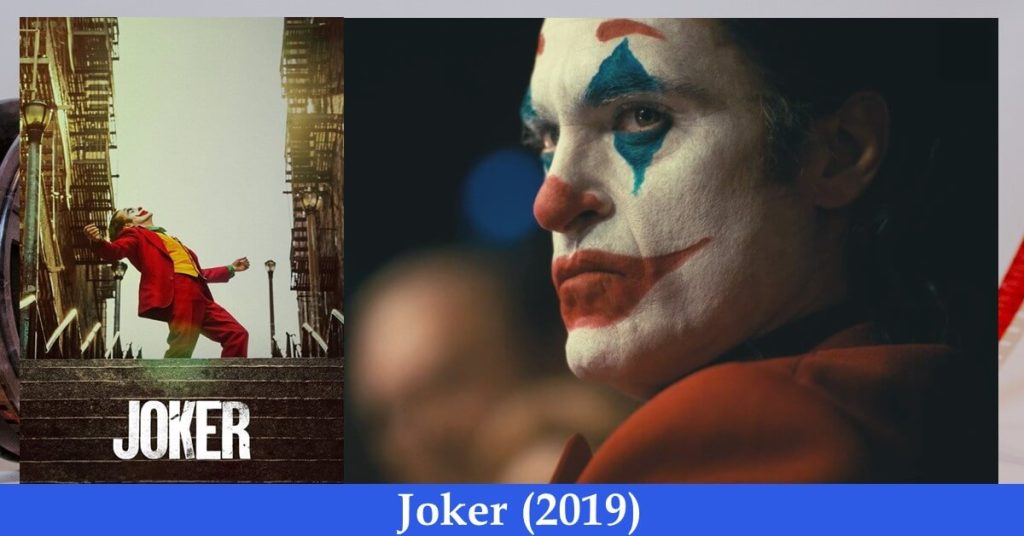Last updated on June 10th, 2024 at 10:20 pm
My Fair Lady 1964 is a classic musical film based on the 1956 stage musical of the same name and later on, was adapted from the 1913 play by George Bernard Shaw, Pygmalion.
Directed by Cukor, it tells of the story a flower girl Eliza Doolittle of London in the early 20th century. With its captivating storyline, unforgettable performances, and enchanting music, My Fair Lady continues to captivate audiences across generations. In this article, we will delve into the various aspects that make My Fair Lady a timeless masterpiece.
My Fair Lady 1964 Film
Background and significance of the film’s release
My Fair Lady, directed by George Cukor, was released in 1964 and quickly became a cultural phenomenon. Because of its cinematic excellence, the film became a culturally important one.
Adapted from Irish playwright George Bernard Shaw’s Pygmalion, the film became a symbol of the Pygmalion Effect or Pygmalion Syndrome, a psychological action in which one’s higher expectation leads him to higher performance and low expectation generates worse performance.
George Bernard Shaw came up with the title from an ancient Greek story Pygmalion, a king and sculpture of Cyprus who fell in love with a statue he made which was given life by Venus or Aphrodite. The film showcases the social and language expectations of people like a Cockney flower seller, Eliza Doolittle, who wanted to improve her social status by learning the way of speaking upper-class English in the 1960s.
Eliza went to a bachelor professor Henry Higgins, a phonetician, to learn how to speak English properly.
It has been anticipated that My Fair Lady’s Professor Henry Higgins portrayed the life of British philologist Henry Sweet. However, the film has become a founding stone of understanding the British cultural landscape.
The film’s release was highly anticipated, given the immense success and popularity of the original play, and it went on to exceed all expectations, captivating audiences with its lavish production and captivating performances.
Impact on the musical genre
With its beautiful and complex plot and soulful songs, My Fair Lay 1964 altered the trajectory of musical genre films. Showcasing the power of music, it conveys strong emotion of love for music.
Its success cemented the way for future musical films, inspiring filmmakers to push the boundaries of creativity and craftsmanship.
My Fair Lady Cast
Iconic performances by the lead actors
What makes My Fair Lady a cinematic triumph is its remarkable cast that breathes reality into the characters.
The lead performances of Audrey Hepburn as Eliza Doolittle are fascinating, to say the least, while Rex Harrison’s role as Professor Henry Higgins is extra-description and compelling. With his impeccable delivery of the film’s quotable and memorable lines and linguistic study methods of enunciation, My Fair Lady has become an important inspiration and example to English language enthusiasts like me.
I literally follow his ideas of phonetics and discoveries in science speech.
Supporting cast and their contributions to the film
The supporting cast such as Wilfrid Hyde-White as phonetician Colonel Pickering, Stanley Holloway as Alfred Doolittle and Glady Cooper’s role as Mrs.
Higgins was also exceptional, while Hepburn and Harrison rightfully stole the spotlight.
Their performances add depth and complexity to the story. Each member of the supporting cast brings a unique energy and talent, enhancing the overall quality of the film.
My Fair Lady 1964 Review
Critical reception and public response upon release
My Fair Lady received widespread appreciation because of its extravagant production design, great performances and musical numbers.
Due to its extraordinary ability to capture George Bernard Shaw’s play, the film has been praised by many film critics. The film was lauded for its dazzling adaptation, thorough consideration of detail, and the way it brought the characters to life.
Viewers around the world were equally captivated which helped the film its box office success and securing its place as a beloved classic one.
Modern analysis and interpretation of the film
My Fair Lady has been hailed as a magnum opus that investigates the theme as the problem of class identity and the revolutionary power of education that has strong relevance to the modern context.
Its undying contemporary significance and underlying messages and imagery kept the scholars and cinephiles bemused.
Today, its characterisation of complexities of social dynamics and the quest for self-discovery regarding one’s education and its value in society reverberate with modern audiences making the film one of the most relatable and citeable film of all time.
Personal Opinion
It is difficult to explain what is wrong with this lavish film version of My Fair Lady without sounding insignificant, hypercritical, and generally tiresome.
So, by all means, let us start with what is right about it. Like Mr. Rex Harrison, for instance, who starred in Cleopatra (1963) and played the role of Professor Higgins, really is extraordinary in this musical version of Pygmalion; and now up he comes, fresh as a daisy, his timing impeccable, his enunciation of the quasi-parlando or declamatory songs Messrs. Lerner and Loewe have devised for his limited but highly personal vocal capacities as sharp as ever, his delivery of Shaw’s best lines (and for that matter the not-quite-so-good pseudo-Shaw Mr.
Lerner has here and there supplied) immaculately stylish. He is the main pleasure of the film, and it is pleasure unalloyed.
There is much pleasure, too, to be derived from Miss Audrey Hepburn as Eliza.
She is never for a moment convincing as the bedraggled Cockney of the opening scenes, but from “The Rain in Spain” on she is irresistible and her performance in the tea party scene is quite splendid.
It is a pity she never seems actually to be singing her songs: not only does the voice dubbed on to her evidently not match her speaking voice, but she just does not look as though, if she did sing, she would sing in that full-blown opera and musical fashion. But otherwise, she does achieve the sort of radiance Eliza must have after her transformation, and that is a lot.
But after the principals, comes the film, and here is something of an anti-climax. Mr. Cecil Beaton’s sets and costumes are often stunning, but always in a stagey sort of way: at their best in the naturalistic (but very elegant, Liberty-dressed) interiors or in the unashamedly stylized Ascot scene, they fall down badly with the other exteriors, Covent Garden and the Street Where She Lives, which are uneasily poised between the two conventions.
And all the effects derived from the designs are essentially static, pretty still pictures: the sets are unimaginatively lit and photographed, and the whole thing is totally lacking in atmosphere and real glamour.
If only Hoyningen-Huene, Mr. George Cukor’s usual pictorial consultant had been beside him in the direction of this film, all might have been very different as it is, the only section of the film in which design is really dynamic is the all-too-brief “Get Me to the Church on Time”, which is performed, incidentally, by Mr. Stanley Holloway with all his familiar gusto.
They are nothing but exasperating, irritating, vacillating, calculating, agitating, maddening and infuriating hags.
~ Henry Hiiggins
Elsewhere the film, though sometimes beautiful, seems a trifle embalmed, and the very measured pace at which it is taken (it runs nearly three hours) does not help either. Still, a lot of people will get a lot of pleasure from it: dare one suggest that more people would have got more pleasure if everyone concerned had not played quite so safe?
From my personal standpoint, watching My Fair Lady is an enchanting experience that allows for both escapism and deeper introspection.
It serves as a reminder of the power of love, the importance of self-acceptance, and the transformative nature of education.
Songs that I wish to hum
To the assumption of taking advantage of Eliza by Higgins emitted by Pickering, Higgins replied with a song that it was not his intention to fall in love with women because of their differing sentiments and likings.
He wanted to know if he was a man of character when women were concerned.
Higgins sings:
An average man am I
Of no eccentric whim
Who likes to live his life
Free of strife
Doing whatever he thinks
Is best for him
Well, just an ordinary man
But let a woman in your life
And your serenity is through
She’ll redecorate your home
From the cellar to the dome
Then go on to the enthralling fun
Of overhauling you
Let a woman in your life
And you’re up against a wall
Make a plan and you will find
She has something else in mind
And so rather than do either
You do something else
That neither likes at all
You want to talk of Keats or Milton
She only wants to talk of love
You go to see a play or ballet
And spend it searching for her glove
Let a woman in your life……. abridged.
And, when Eliza escaped from home for not getting proper attention, Higgins became very anxious and wondered about the possible reasons for her escape.
He then sang the number to Pickering to express his imagined irrationality of women. He wished women to be manly, independent and equal to men.
He began:
Women are irrational, that all there is to that.
Their heads are full of cotton, hey and rags.
They are nothing but exasperating, irritating,
vacillating, calculating, agitating,
maddening and infuriating hags.
Why can’t a woman be more like a man?
Yes, why can’t a woman be more like a man?
Men are so honest, So thoroughly square,
Eternally noble, historically fair,
Who, when you win,
Will always give your back a pat
Well, why can’t a woman
Be like that?
Why does everyone,
Do what the others do?
Can’t a woman learn, To use her head?
Why do they do everything,
Their mothers do?
Why don’t they grow up,
Well, like their father instead?……abridged.
And there is another number I like very much. It was lip-synched by Eliza to Professor Higgins when he found her at his mother’s residence. Eliza refuses to return to his place unless he can guarantee her a kind of kindness instead of brazen indifference toward her just because she is an ignorant common flower girl. On the contrary, she said she can do and go without him and would marry Freddy.
I found her stand to be an independent woman and the idea of leaving him because of his pass over on her femininely empowering. She goes on-
There’ll be spring every year,
Without you, England still will be here
Without you,
There’ll be fruit on the tree
And a shore by the sea,
There’ll be crumpets and tea,
Without you,
Art and music will thrive,
Without you,
Somehow Keats will survive
Without you,
And there still will be rain,
On that plane down in Spain
Even that will remain
Without you……abridged
Few great lines to remember
Once at her residence Mrs Higgins, Henry’s mother asked him if she learned anything good manners from him.
She replied by saying that if Professor Pickering hadn’t been there, she would not know how a gentleman and lady must behave. He treats her with respect, something better than a common flower girl, while Higgins always treats her as a flower girl which she does not like.
She said to Mrs Higgins, “You see, Mrs Higgins, apart from the things one can pick up, the difference between a lady and a flower girl is not how she behaves, but how she is treated.”
Eliza expected a little better treatment from him instead of being passed over or being treated like a handmaid when the necessity arose.
But when she complained and questioned him about his manner and discriminatory behaviour, I liked the way Higgins responded which speaks to me as well. He said, “You see, the great secret, Eliza, is not a question of good manners or bad manners or any particular sort of manners, but having the same manner for all human souls. The question is not whether I treat you rudely, whether you’ve ever heard me treat anyone else better.”
You see, the great secret, Eliza, is not a question of good manners or bad manners or any particular sort of manners, but having the same manner for all human souls. The question is not whether I treat you rudely, whether you’ve ever heard me treat anyone else better.
~ Profesor Henry Higgins
Eliza did not care about his proposition of his equal treatment to all, she rather expected not to be passed over or she did not want him to be indifferent toward her.
As she determined to leave him for good and marry her lover and wanted to get along without him, Higgins just proposed, “If you can’t appreciate what you have got, you get what you can appreciate”.
Another fascinating aspect of the My Fair Lady is the representation of so-called “middle-class morality”, which Eliza’s father said he cannot afford it because of his financial and social position. When Alfred P.
Doolittle visited Professor Higgins and Professor Pickering at the former’s residence and demanded 5 pounds in exchange for his daughter, astounded Pickering asked, “Have you no morals?” “No, I cannot afford morals”, replied Afred.
My Fair Lady 1964 Songs
Exploration of the memorable musical numbers
My Fair Lady features a plethora of unforgettable musical numbers, each adding depth and emotion to the storyline.
From the lively and energetic Wouldn’t It Be Loverly to the enchanting I Could Have Danced All Night, the songs in the film bring the characters’ emotions to life and serve as a means of storytelling. The Rain in Spain showcases Eliza’s progress in vocal training, while On the Street Where You Live encapsulates the enchantment and longing felt by Freddy Eynsford-Hill, played by Jeremy Brett. The songs of My Fair Lady have transcended time, becoming iconic pieces of cinematic history.
Importance of music in conveying the story’s emotions
Music plays a crucial role in My Fair Lady, serving as a means for emotional expression and character development.
The carefully crafted lyrics and melodies work in harmony to communicate the characters’ desires, fears, and transformations.
Through music, the audience is able to witness Eliza’s development, Henry Higgins’ inner struggles, and the profound impact of their relationship.
The songs elevate the narrative, inducing empathy and connecting viewers on a deeper emotional level.
My Fair Lady Plot
Detailed summary of the film’s storyline
The story of My Fair Lady begins with Eliza Doolittle selling flowers in Covent Garden, London.
Without her knowing Herny Higgins, a phonetician by hobby, was taking note of her acentric accent while angrily raving over a man ruing into her and spoiled a fair of violet. He demonstrated in the market that he tells one’s origin by listening to his accent and complaining why the English can’t speak English properly. He challenged that he could teach her to get rid of her Cockney accent, transform her into a lady and pass her off as a duchess at an Embassy Ball.
He met Professor Colonel Pickering, a phonetician himself came to meet him. Eliza follows Professor Higgins and offers him to teach her to speak well so can be a better flower girl.
But intrigued by her determination, Professor tells him that he will pay for all the necessary things for the experiment if he succeeds.
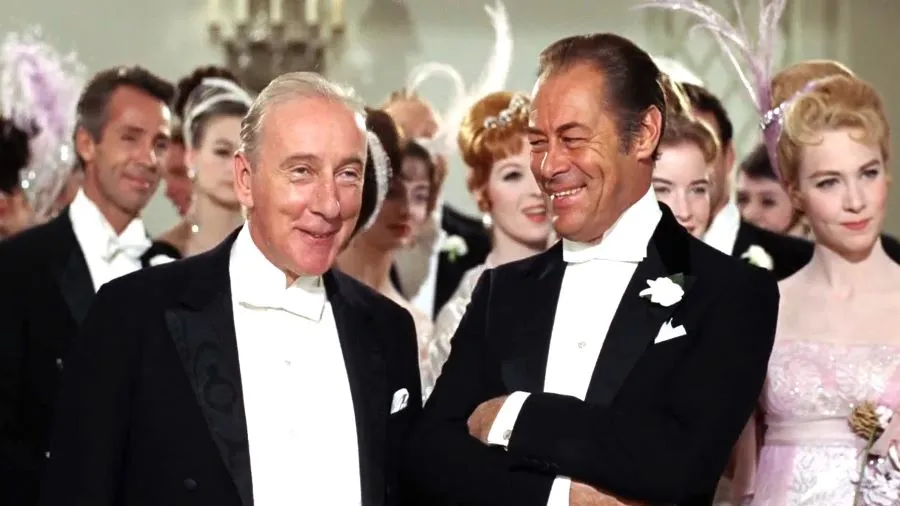
Determined to remain a free man and a bachelor, Higgins begins with his lessons with the alphabets. With numerous hours spent on her pronunciation and a great deal of hard work, she finally was able to get rid of her accent to acquire the higher-class accent, she was taken to Ascot horserace as a trial run. Though showed improvement initially, she suddenly lapses into a vulgar cockney accent making everyone apauled. Pickering suggested him to give-up his afford as she made no progress.
Instead of giving up, Higgins takes her to the Embassy Ball where she draws the attention of upper-class people and gets to dance with a foreign prince, Prince of Transylvania.
But a Hungarian phonetician and a former student of Higgins and an imposter detector, Zoltan Karpathy, was also at the Ball appointed to find out her class by her speech.
However, dancing with her he declared that the English is so good that she sounds like a foreign and a Hungarian princess.
However, Eliza was sad that after her affords all credit was given to Professor Higgins. Fed up she wanted to know about her future, for the fact that he was using her merely for his benefit. Pointing his ingratitude, she wanted to go back to her old life with Freddy who was still waiting for her response for days. Going back to her old place she found out that her father, who used to survive on her handouts, was now a prosperous person due to the fortune an American left to him, who was recommended by Higgins to him.
However, like Eliza who lamented for losing her usefulness to the upper or lower class because of her high expectations, her father also complained to Eliza that Higgins had ruined him by recommending him to the American who was looking for a moralist.
He is now bound by “middle-class morality”.
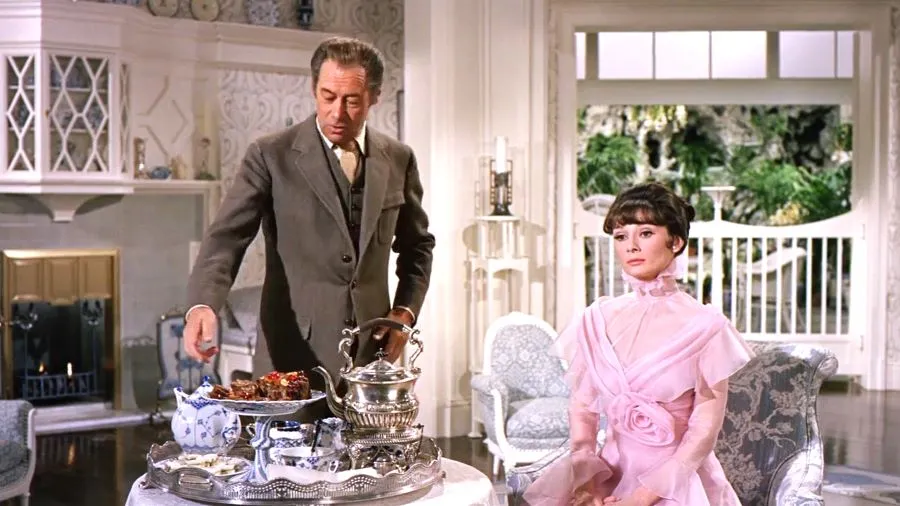
Higgins searched for her the next day and realised that she was gone but was relieved to find her at his mother’s residence where he tried to talk of her coming back. Instead of saying anything affirmative, she declares that she is going to marry her lover, Freddy and going to be an assistant to Zoltan Karpathy which angered Higgins. On his way home he realised that she had become a part of his life which he expressed in “I have grown accustomed to her face”.
At home, overcome by loneliness, he plays her voice on the gramophone while Eliza comes back stealthily and turns it off to draw his attention.
Key themes and messages portrayed
At its core, My Fair Lady explores themes of identity, societal expectations, and personal growth.
The film delves into the question of whether one’s true worth is determined by birth and social standing or by education and personal accomplishments. It challenges stereotypes and emphasizes the importance of empathy, understanding, and the power of language. My Fair Lady reminds us that the way we speak and present ourselves should not define our value, and that true beauty lies in embracing our individuality and the ability to connect with others beyond surface appearances.
Who Starred in My Fair Lady 1964
Analysis of the main characters and their actors
In My Fair Lady 1964, Audrey Hepburn shines as Eliza Doolittle, showcasing her versatility as an actress and captivating viewers with her vulnerability and grace.
Hepburn perfectly embodies Eliza’s transformation from a humble flower seller to a refined lady, capturing both the strength and fragility of the character.
Rex Harrison delivers a remarkable performance as Henry Higgins, capturing the complex layers of this socially detached intellectual with unparalleled finesse.
Notable performances and character development
The performances of Audrey Hepburn and Rex Harrison are the heart and soul of My Fair Lady. Hepburn’s ability to convey Eliza’s internal struggles and growth is nothing short of noteworthy.
Through her nuanced portrayal, we witness Eliza’s evolution from an insignificant, lower-class girl to a confident woman who refuses to be defined by society’s outlooks and conventions.
Rex Harrison’s portrayal of Henry Higgins, with his dry wit and withdrawn nature, adds depth to the film.
As the story progresses, we see Higgins grapple with his own insecurities and emotional conflicts, ultimately leading to personal growth and self-reflection.
Is My Fair Lady 1964 Film Worth Watching
Arguments for and against watching the film
My Fair Lady 1964 is worth watching for numerous reasons.
Firstly, its timeless story and captivating performances continue to reverberate with contemporary audiences, offering a profound investigation of human nature and the complexities of societal expectations, especially of women. The film’s stunning visuals, superior production design, and iconic musical numbers make it a visual and soulful treat to heart. However, some critics tend to argue that the film’s romantic facets disseminate outmoded gender norms.
Despite this criticism, the film’s long-standing fame and cultural impact cannot be denied, making it a compelling choice for film enthusiasts.
My Fair Lady 1964 Film Awards
Recognition and accolades received by the film
My Fair Lady 1964 was met with critical acclaim upon its release and received multiple awards and nominations.
The film was nominated for twelve Academy Awards, including Best Picture, and won eight, including Best Director for George Cukor and Best Actor for Rex Harrison. It also won several Golden Globe Awards and BAFTAs, cementing its status as a cinematic masterpiece. The film’s achievements in the realm of awards further solidify its legacy and enduring appeal.
My Fair Lady is 91th of 100 America’s Greatest Movies by the American Film Institute, the Library of Congress enlisted it in its Complete Nation Film Registry Listing in 2018, and it’s one of the 101 educative films of 100 years that I have been reviewing.
Origin of My Fair Lady 1964
Historical context and development of the film
My Fair Lady 1964 emerged out of a rich cultural and theatrical heritage.
The film’s storyline originates from Irish playwright George Bernard Shaw’s play Pygmalion, which premiered in 1913. This play, in turn, was influenced by ancient Greek myths and the concept of transformation. Shaw’s witty dialogue and social commentary struck a chord with audiences, leading to the decision to adapt the play to the silver screen, a screenplay written by Alan Jay Lerner.
The adaptation seamlessly integrates the play’s themes of class and identity, providing a fresh perspective on Shaw’s work while respecting its original intent.
My Fair Lady 1964 Director
Insight into the director’s vision and style
George Cukor, the director of My Fair Lady 1964, brought a unique vision and style to the film. Known for his thorough attention to detail and his ability to create captivating character-driven narratives, Cukor successfully captured the tones of the script, adding depth and complexity to the story.
His acute sight for aesthetic beauty and his prominence on the emotional journeys of the characters shine through in every frame, elevating My Fair Lady into a cinematic work of genius.
My Fair Lady 1964 Film Trivia
Fun and interesting facts about the film’s production
1. Audrey Hepburn was initially not considered for the role of Eliza Doolittle, with Julie Andrews being the preferred choice. However, Hepburn eventually played the role and delivered a phenomenal performance.
2. Rex Harrison had previously portrayed Henry Higgins in the original Broadway production of My Fair Lady, making him a natural choice for the film adaptation.
3. The film’s iconic Ascot horse race scene required over 200 extras, all dressed in meticulously designed costumes and elaborate hats.
4. Julie Andrews, who had been passed over for the film’s leading role, went on to win an Academy Award for Best Actress the same year for her performance in “Mary Poppins.”
I sold flowers I didn’t sell myself. Now you have made me a lady of me and I am not fit to sell anything.
Conclusion
There are many films which demand repeated viewing, My Fair Lady is certainly one of them.
Films like Lawrence of Arabia 1962, Braveheart 1995, Casablanca 1942, the English Patient 1996 and many others, My Fair Lady is bound to make a cinephile come back for more. The powerful acting, screenplay, citeable dialogues, soulful music and cinematography make the film capable of inducing viewers everlastingly thirsty as if one cannot be quenched with one or two viewings.
I highly recommend it as an educative one.
My Fair Lady 1964:
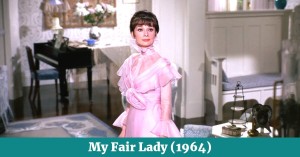
10
My Fair Lady 1964

10
